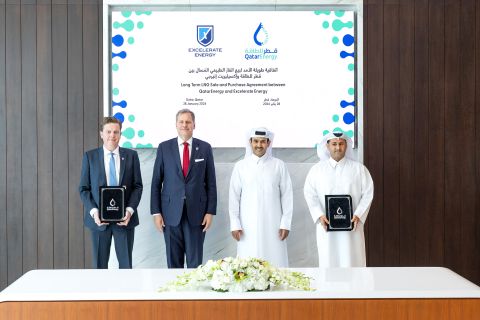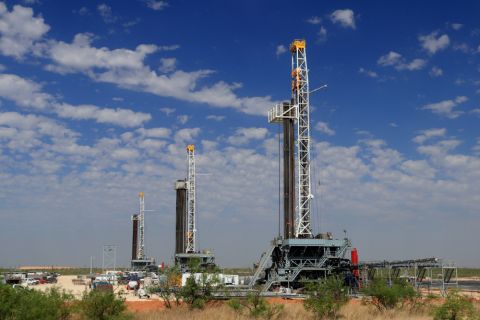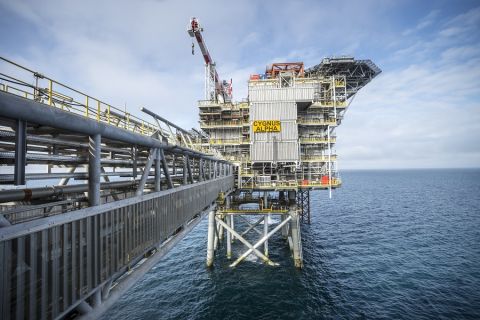Sitting in the offices of Caspian Wireline Services (CWS), one cannot miss the buzz in the air. The company, founded in Baku by Tom Dunlap and two associates some four years ago, has been going from strength to strength, riding on the tidal wave of activity in the region. "We were all working in operations in Oklahoma with $8 oil, wondering what we could do about the situation. Having all worked overseas at one time or another, we looked at a number of prospective areas and the Caspian Sea looked the most promising," explains Dunlap. Kicking off their stint in Azerbaijan with a share in an onshore production-sharing agreement (PSA), the group quickly discovered that many operational services one would expect in more developed areas were too costly, unavailable or unsuitable to their needs. This discovery led to the creation of CWS and sale of their interest in the PSA. CWS' current president and chief executive officer Calvin Wilson says, "This is where CWS comes in; we are trying to provide services that fit the operator's purpose cost-effectively." The Caspian Sea story is dominated by the majors, which have sunk hundreds of billions of dollars into PSAs and joint ventures. Venturing into these battered countries, Azerbaijan had a particularly bloody battle for independence, many of the basic services were lacking and the concept of a five-star hotel was nonexistent. During the height of Soviet exploitation of the hydrocarbons in the region, Baku was central to all hydrocarbon projects in the area. The city contained the only academy dedicated to the industry with many of the today's Russian industry players having received their education there. Located on the coast of the Caspian Sea, Baku was also the engineering hub for all offshore exploration and production, providing all that was needed to service the industry. Like the actual production facilities that extracted the oil, either onshore or offshore, these manufacturing and support facilities suffered from years of neglect and lack of investment. All this was made worse by the fact that sitting in these dead and decaying yards were thousands of highly skilled and experienced workers whose forefathers were involved in the industry for decades. That was more than a decade ago and it is the likes of CWS that have helped the country regain its position within the region as a major manufacturing and support facility. As Wilson points out, "The original reason CWS was able to come and break into the market was because operators were not receiving the level and variety of service that was possible. We were able to act as a niche player and provide the kind of services that others were not able or willing to." In 1994, when the BP-led Azerbaijan International Operating Co. (AIOC), a consortium comprised of 10 operators, was established to exploit the Azeri-Gunesli-Chirag (ACG) Field, a plethora of other PSAs was signed with international majors for both onshore and offshore concessions. As the majors arrived, so to did the usual list of supporting companies. Companies such as Halliburton and Baker-Hughes have been in the country for at least as long as the likes of BP; and in turn, these contractors have attracted a further gaggle of subcontractors. A situation not unlike what you will find in West Africa and the Arabian peninsula evolved where one had all the usual suspects working hand in hand in the exploitation of the fields. However, what is interesting to note is the extent to which much smaller operators have shunned these locations and have concentrated their operations on the Caspian. PCH, an Australia-based contractor took the plunge in 1999 and today controls over 90% of the scaffolding and painting market. "At the beginning we took an incredible bet on Azerbaijan," explains Craig Dunn, PCH director, Caspian region. "We were not covered by a PSA, so we did not receive the same kind of tax and VAT exemptions that other companies enjoyed." Trucking in more than 3,000 tons of scaffolding through Iran, the company needed the equipment in-country to assure it could bid credibly for tenders which would have been beyond their reach if the equipment had been kept outside Azeri borders. "After a few painful years, I can say that today, our Azeri operation is an extremely important contributor to the company's balance sheet." CWS and PCH are only two examples highlighting the bets that have paid off. Others include the likes of BUE, which as the No. Two operator in the North Sea is the largest provider of marine supply and support services to offshore rigs from Azerbaijan to Kazakhstan. Starting operations in 1990 with three Soviet-era tugs, BUE's fleet has increased to 13 and will increase further in the future. With exploration and production increasing constantly in the region, BUE's Caspian operations are likely to overtake their more mature operations in the North Sea. There is no doubt that the presence of majors in the country has led to a trickle-down effect, with the producers attracting their contractors who, in turn, attract their contractors and so on. Similarly, it is country leaders such as BP who actively encourage and require their suppliers to increase the level of local content within their operations. Given the supply of experienced workers, it is a situation of which many are eager to make use, not only in the face of social responsibility, but also economic sense. It is the presence of this skilled workforce that attracted the likes of John Hart, who recently took over the dilapidated Azerboru, a pipe-rolling plant established more than 50 years ago as the region's primary producer of oil country tubular goods (OCTG). An energetic supporter of Azerbaijan and all that the country has achieved, Hart explains, "We have enormous potential here. The capital equipment is in dire need of repair and replacement, but it is the presence of the human factor that has made this investment so interesting to us." With more than 10 years of experience in the region, Hart was keen to take part in the government's privatization process. "There is incredible potential opportunity in the region, and we are keen to build up our infrastructure in the region to make a success of this venture. I am very excited by this opportunity." Hart is also particularly keen to promote the openness of government institutions in ensuring that their work with local companies has always been successful. "At every turn of the privatization process, and subsequent to the event, we have received the absolute backing of the government," says Hart. His investment is based on economic principals that will surely start to filter down to other local service providers. "As a local provider of piping, contractors are obliged to purchase their pipes from us, even if we are up to 10% more expensive." To underline the point, Azerboru will receive $50 million of investment during the next three years to upgrade its current facilities including the development of API-standard finishing and pipe-rolling. The company intends to turn these investments into real returns by achieving nearly a 20% share of a $1.3-billion market by 2007. There is no doubt that while major companies source their pipe requirements from outside the region; legal, economic and time constraints will ensure that Azerboru will eventually become the supplier of choice. By harnessing the skills of the local workforce with the new equipment being progressively installed, there is every reason for this Soviet-era relict to regain its former position within the region. While it has been foreign expertise and money that has spawned a local, albeit foreign-owned, supply and service industry, every level of the supply chain is keen to point out the level of local content. BP is the obvious leader, financing everything from local training schools to a Caspian Business Center, which helps Azeri businesses compete more effectively for jobs within the hydrocarbon business. The majors' local workforce is required to be more than 70% Azeri nationals. Azerbaijan is not alone in this region for promoting local participation. Kazakhstan has also enjoyed an influx of foreign knowledge and finance. However, upon first impression it would be hard not to notice that the Azeris are more welcoming of foreign involvement than the Kazakhstanis. As one interviewee put it, "One is working with willing participants in Azerbaijan, whereas in Kazakhstan, one gets the feeling that they already know it and don't need your help." This may be true, but given the international standards of safety, environmental and social concern that is practiced in the region, locals need the input of international operations to comply with these standards. "There is no doubt that both countries will develop world-class service and support industries, however, they require patience and hard work to ensure that this becomes the case." Finally, while the region may be viewed as sewn-up by the early entrants into the market, many are keen to stress that the market is wide open. George Macleod of BUE says, "We may be market leaders in our business, but we have to be constantly vigilant to ensure that our clients know that they are getting a top-class service at a competitive price." Speak with the Turks, only a virtual stone's throw away from the area, and they will assure you that there continues to be a wealth of opportunity in the region, and not just limited to the hydrocarbon industry. Istanbul-based Borusan Makina, the region's representative for Caterpillar equipment, is already responsible for managing the pumping stations for the Supsa pipeline (from Sangachal near Baku to the Black Sea coast at Supsa). "We already have a significant foothold in the region," explains Borusan Makina managing director Tayfun Iseri. "However, we are now realizing plans to take advantage of the growth of opportunities that are presenting themselves, especially in Kazakhstan." With a particularly volatile market at home, the company is confident that the Caspian region can provide an engine for growth over the next few years. Whether investors are small or large, they have been successful in negotiating the bureaucracy and red tape that are slowly disappearing. Now that the businesses have been established in Baku or Atyrau (in Kazakhstan), their focus is now looking increasingly across the sea to opposite shores. George Whittenburg, with Parker Drilling, which has been operating in the Caspian Sea region since the mid-1990s, puts it, "Sixty percent of our worldwide business originates from the region and with another two rigs being sent down to Turkmenistan, it will continue to be an important part of our future for some time to come."
Recommended Reading
Excelerate Energy, Qatar Sign 15-year LNG Agreement
2024-01-29 - Excelerate agreed to purchase up to 1 million tonnes per anumm of LNG in Bangladesh from QatarEnergy.
UK’s Union Jack Oil to Expand into the Permian
2024-01-29 - In addition to its three mineral royalty acquisitions in the Permian, Union Jack Oil is also looking to expand into Oklahoma via joint ventures with Reach Oil & Gas Inc.
Eni, Vår Energi Wrap Up Acquisition of Neptune Energy Assets
2024-01-31 - Neptune retains its German operations, Vår takes over the Norwegian portfolio and Eni scoops up the rest of the assets under the $4.9 billion deal.
NOG Closes Utica Shale, Delaware Basin Acquisitions
2024-02-05 - Northern Oil and Gas’ Utica deal marks the entry of the non-op E&P in the shale play while it’s Delaware Basin acquisition extends its footprint in the Permian.
California Resources Corp., Aera Energy to Combine in $2.1B Merger
2024-02-07 - The announced combination between California Resources and Aera Energy comes one year after Exxon and Shell closed the sale of Aera to a German asset manager for $4 billion.





